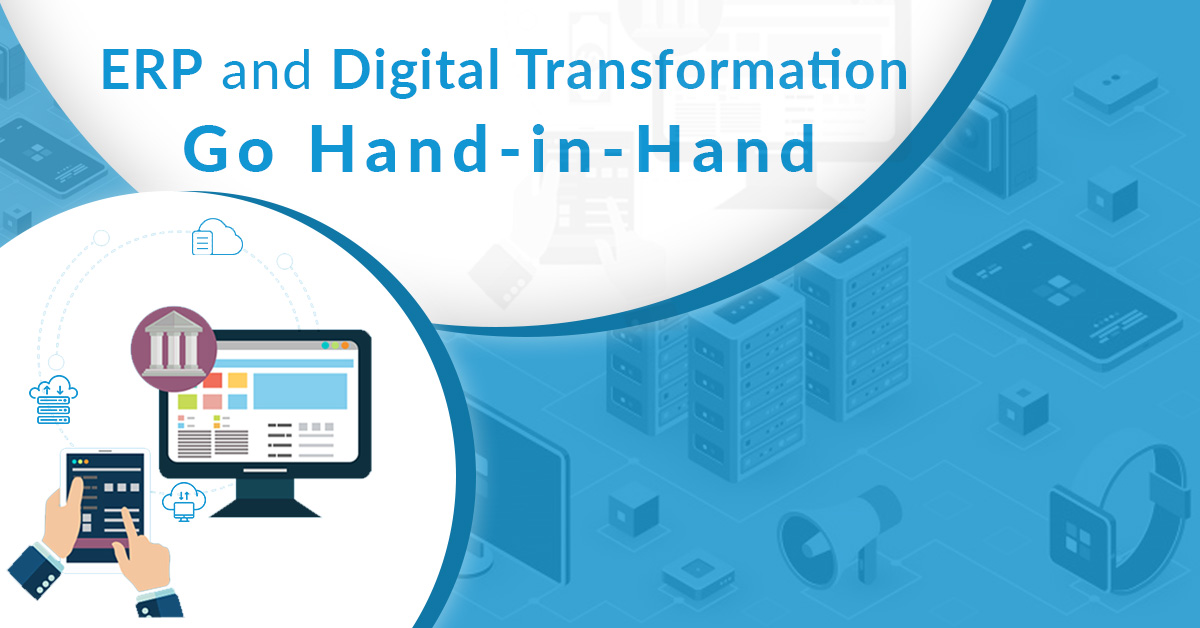The philosophy of digital transformation revolves around integrating digital technology into various areas of a business.
In today’s digital era, the customer expects much more in terms of experience. Customers are becoming tech-savvy with every passing day, and businesses need to be quick in catering to the ever-changing needs of customers. Digital transformation helps businesses in achieving the objective of handling the requirements of customers. Companies understand the need for digital transformation as, according to a report by IDC, digital transformation spending is set to reach $1.97 trillion by 2022.
ERP plays a vital role in aiding digital transformation by bringing efficient systems in various business processes like finance, inventory, and accounting. Let us have a look at the multiple ways in which ERP can benefit your business
Benefits of ERP in your business
Better productivity
An ERP system helps the users in gaining access to many areas of activity in real-time, like customer information, invoices, accounting, inventory, and others. This data empowers the users by providing them with value-added details when they require it.
AI in ERP
ERP systems help in streamlining data flow in and out of business which helps in improving the daily business activities making it easy for companies to gather data and utilize it efficiently. You can add emerging technologies like RPA, AI, and advanced analytics to streamline data flow directly from devices to the ERP system.
Companies like Wallmart are managing their warehouses by using state of the art AI systems. The drones fly through the humongous inventory of the warehouses of Wallmart scanning products and checking for misplaced items in the warehouse. Then this data is fed into the AI systems of Wallmart, which then analyzes the data and helps the store managers of Wallmart in managing the inventory. The primary function of the operations of Wallmart is invoice processing. BMW can track down every part of every vehicle that it manufactures in over 31 assembling units using AI systems.
AI systems can help in improving the financial management of a business by efficiently handling the invoices. Smart AI systems can easily categorize thousands of invoices into their correct categories. For example, AI systems can distinguish between a phone purchase bill and the monthly phone bill. AI systems can also compare the various statements and financial reports and check them for their accuracy.
Improved operational costs
ERP helps in reducing the costs of various business operations. The people accessing the ERP system can have the advantage of gaining information from a central database, instead of trying to scamper data from multiple databases. It helps in reducing costs and improving operational efficiency.
Enhanced decision-making power
ERP software increases productivity by highlighting the essential decision areas which aid the decision-makers in taking correct decisions effectively.
Removing inconsistent data
Inconsistencies creep in when data is gathered through multiple devices. ERP gives access to reliable data and eliminates the discrepancies in data, as it can update in real-time. The users can be pretty sure that the data is consistent and the analytics are accurate. The accuracy and consistency of data will help in providing confidence to people. ERP systems have an in-built provision of security via firewalls. Having proper security provisions helps the users in avoiding the data getting into the wrong hands.
A significant source of inaccurate data is human error. An ERP system reduces the need for manual data entry. Hence an ERP system eliminates the possibility of human mistakes, improving the quality of data substantially.
Gain a competitive edge
A robust ERP system can accord your business an unbeatable competitive edge. Imagine the situation wherein your competitor is unable to gain from a streamlined, consistent flow of information. Your company will be at an advantage, and it would be an uphill task for the competitor to beat you if you have a sound ERP system. With ERP on your side, you decrease the possibility of making costly business mistakes.
Better scalability
One of the best aspects of ERP is scalability. Suppose your business outgrows your expectations within a short period, then ERP can handle various business tasks in your company efficiently. Apart from being scalable, ERP is also a very adaptable system. Companies like SAP, which manage these systems, always upgrade these systems to keep them updated with the latest regulatory and technological changes. This makes it easier for businesses to improve themselves and helps them in scaling their business quickly.
Cost of doing nothing
Sometimes the cost of not doing something far outweighs the cost of doing it. Implementing an ERP system is one of those things where people tend to delay the decision, waiting for the “Right Time.” One of the common scenarios that businesses face is that they grow very fast, and they tend to delay the decision to implement an ERP system. They fail to understand that as the business grows, so do the requirements for better reporting and faster decision making. The longer you leave the decision pending, the worse the situation becomes. Often the best organizations are the ones that implement the ERP system much ahead of time.
With the growth of a business, the complexity also increases. If you do not have an ERP system by your side, then this complexity becomes unmanageable. There are many third-party solutions like estimating, accounting, invoicing, reporting, and manufacturing, which needs to integrate with the business. Information is required at the fingertips to make better and faster decisions. It can be achieved through a sound ERP system.
Business is all about taking the opportunities that come your way. Think about the cost of missed opportunities, those that you stand to lose just because you do not have a prudent ERP system in place.
Latest developments in ERP
As the technology moves at a faster pace so does the businesses in implementing them. It’s a race, to which there is no end but the winner is decided based on the level of implementation and integration which makes it easier for the businesses to move ahead with better efficiency. Now, as we have learned about how ERPs could play a vital role in helping the businesses reach the top spot, let’s have a look at the ERP that enables them with such power;i-ERP
i-ERP is the system that uses machine learning and advanced analytics suites to analyze large sets of data to track, learn, and forecast inferences from data sets.
i-ERP systems help in resource optimization, enhanced user experience, reducing operating costs, and real-time data analysis.
Cloud-ERP
Cloud-ERP systems are ERP systems that are based in the cloud. The primary characteristic of a cloud ERP system is that it has a shared database that can be accessed by employees from any location.
The benefit of a Cloud-ERP system is that it is more mobile and accessible than traditional ERP systems. Your company can gain by having an improved collaboration between various departments if it uses Cloud-ERP.
To wrap up
Digital transformation cannot be imagined without upgrading your business systems. ERP helps in the up-gradation of operations by providing timely information to the decision-makers. Thus there is no real digital transformation without ERP, and both these processes go hand-in-hand.












